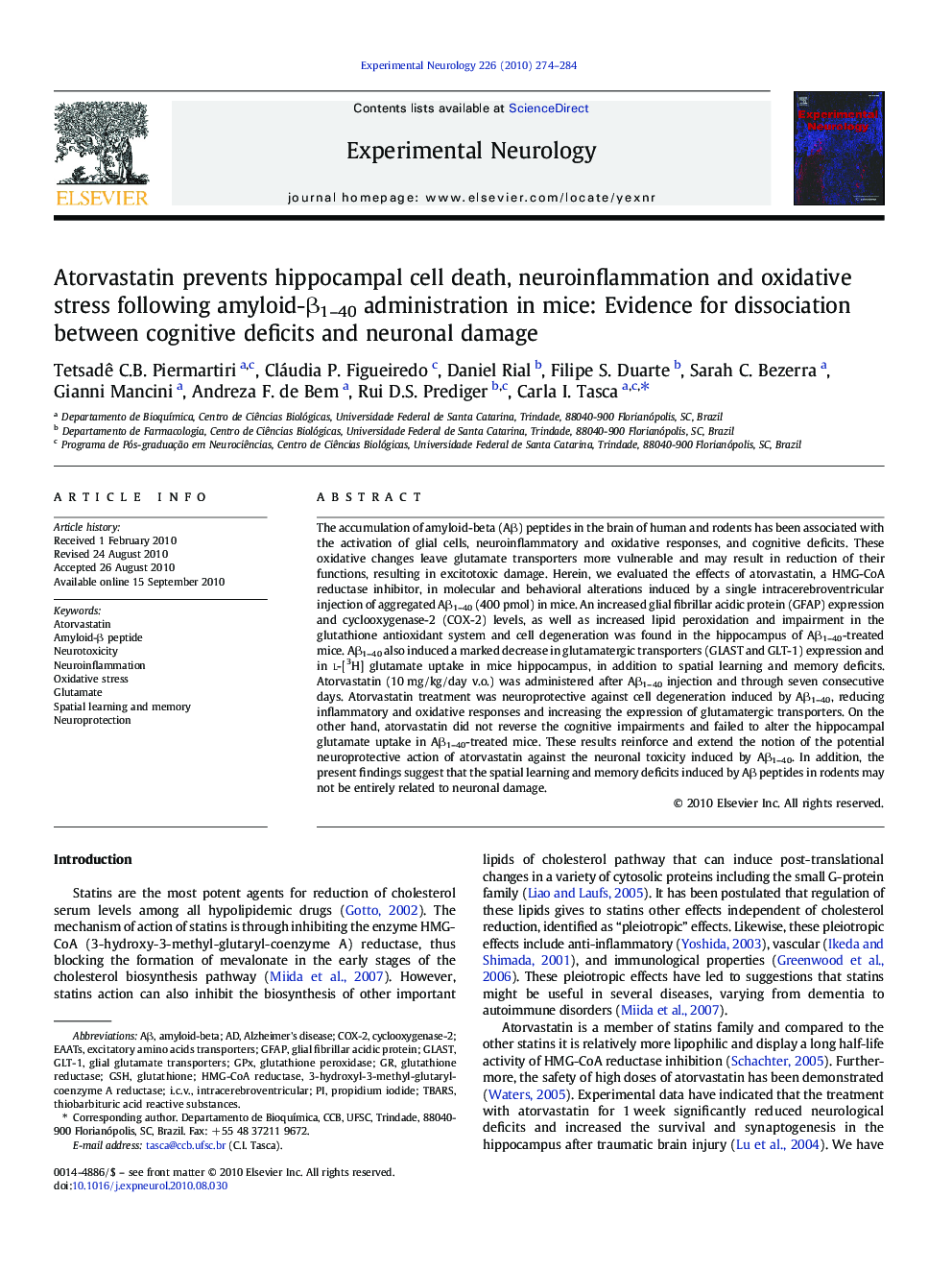| کد مقاله | کد نشریه | سال انتشار | مقاله انگلیسی | نسخه تمام متن |
|---|---|---|---|---|
| 3055760 | 1186537 | 2010 | 11 صفحه PDF | دانلود رایگان |

The accumulation of amyloid-beta (Aβ) peptides in the brain of human and rodents has been associated with the activation of glial cells, neuroinflammatory and oxidative responses, and cognitive deficits. These oxidative changes leave glutamate transporters more vulnerable and may result in reduction of their functions, resulting in excitotoxic damage. Herein, we evaluated the effects of atorvastatin, a HMG-CoA reductase inhibitor, in molecular and behavioral alterations induced by a single intracerebroventricular injection of aggregated Aβ1–40 (400 pmol) in mice. An increased glial fibrillar acidic protein (GFAP) expression and cyclooxygenase-2 (COX-2) levels, as well as increased lipid peroxidation and impairment in the glutathione antioxidant system and cell degeneration was found in the hippocampus of Aβ1–40-treated mice. Aβ1–40 also induced a marked decrease in glutamatergic transporters (GLAST and GLT-1) expression and in l-[3H] glutamate uptake in mice hippocampus, in addition to spatial learning and memory deficits. Atorvastatin (10 mg/kg/day v.o.) was administered after Aβ1–40 injection and through seven consecutive days. Atorvastatin treatment was neuroprotective against cell degeneration induced by Aβ1–40, reducing inflammatory and oxidative responses and increasing the expression of glutamatergic transporters. On the other hand, atorvastatin did not reverse the cognitive impairments and failed to alter the hippocampal glutamate uptake in Aβ1–40-treated mice. These results reinforce and extend the notion of the potential neuroprotective action of atorvastatin against the neuronal toxicity induced by Aβ1–40. In addition, the present findings suggest that the spatial learning and memory deficits induced by Aβ peptides in rodents may not be entirely related to neuronal damage.
Research highlights
► A single i.c.v. injection of aggregated Aβ1–40 induced neuronal degeneration in the hippocampus 16 days after Aβ infusion.
► Aβ1–40 treatment caused increased GFAP and COX-2 expression, increased lipid peroxidation and impairment in the glutathione antioxidant system.
► Aβ1–40 induced a marked decrease in glutamate transporters (GLAST and GLT-1) expression and in glutamate uptake in mice hippocampus, in addition to spatial learning and memory deficits.
► Atorvastatin treatment (10 mg/kg/day v.o., for 7 days) failed to reverse the cognitive impairment and to alter the hippocampal glutamate uptake in Aβ1–40-treated mice.
► Atorvastatin was neuroprotective against cell degeneration induced by Aβ1–40, reducing inflammatory and oxidative responses and increasing the expression of glutamate transporters.
Journal: Experimental Neurology - Volume 226, Issue 2, December 2010, Pages 274–284